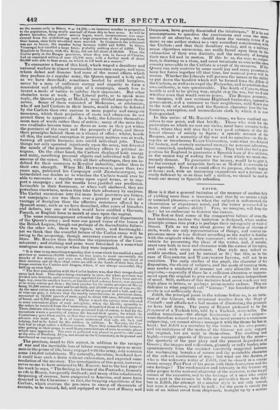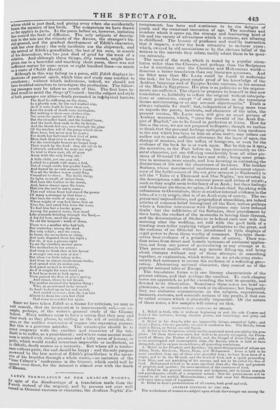EDITH.
How is it that a general imitation of the manner of another fails of yielding more than a transient, and that by no means a high or unmixed pleasure,—even when the subject is unborrowed, the observation or experience novel, and the writer possessed of no mean share of native ability ? Few, we imagine, will deny the fact : let us endeavour to discover the causes.
The first or final cause of the comparative failure of even the best imitations, (unless the imitation is designed, when another principle comes into play,) is perhaps their incongruity or want of fitness. Talk as we may about graces of diction or charms of style, words are only representatives of things, and convey im- pressions more or less distinct according as the reader is familiar with the originals which they represent ; while style is merely a vehicle for presenting the ideas of the writer, and, if natural, must vary both in tone and character with the nature of his topics, and even with every sentiment. One style may indeed re- semble another, and yet be natural or fit ; but this, as in the case of GOLDSMITH and WASHINGTON IRVING, will not hean imitation. The early studies of the pupil, the character of his disposition, the choice of subjects, and the mode of treating them, may render a similarity of manner not only allowable but even requisite,—especially if there be a sufficient alteration or improve- ment upon the original to give evidence of a certain independence of mind. Still, authors of this imitative kind never reach any very high place in letters, or perhaps permanently endure. They are deficient in what pugilists call " bottom:" the foundation of their works is not sufficiently deep. Edith, the principal poem in the volume before us, is an imita- tion of the Giaour, with occasional touches from the Siege of Corinth ; and affords not a bad means of illustrating the principle we have laid down. The poem of BYRON professed to be the fragment of a Turkish tale, told by a Turkish story-teller. The sudden transitions—the abrupt beginnings of a new subject— were therefore natural to a reciter, who must preserve a continuous outpouring, yet cannot always manage it with the theme he has in hand : but Edith is a narrative by the writer in his own person; and his imitations of the modes of the Giaour not only suggest the original, but are unfit in them elves. The startling and highly-wrought appeals of BYRON are warranted by the scene— the spectacle of the past glory and the present degradation of
Greece; the images and reflections, gloomily or sadly tender, arise spontaneously from the contrast inevitably suggested between the unchanging beauties of nature and the perishable character
of the nob:est institutions of man : but what are the Azores, or who is the unknown writer of Edith, that he should in a sun*
strain occupy Part First of his poem a ith their description and his
own feelings ? The condensation and intensity in the Gtaour are, alike proper to the national character of the narrator, to the tragic nature of the narrative, and to the feelings of a roan who either bore a part in the crimes he tells or personifies those who dad: but in Edith, the attempt at a similar style is not only unreal, but were it otherwise, would be unfit ; for the
poem is merely the tale of an infant saved from shipwreck, brought up by a mother
whose child is just dead, and pining away when she accidentally tertainmcnts has been and continues to be the delight of teas the mystery of her birth. The comparison we have drawn youth and the occasional recreation of age. The novelties and so far applies to parts. In the poem before us, however, imitation wonders which it opens up, the strange and fascinating kind of has caused the fault of diffusion. The only subjects of descrip- life and the variety of adventures which it contains, are alluring Lion in the tale are the climate of the Azores, the stranger's bu- to childhood. The lessons of prudence and wort lly instruction rikground, and the gradual development of Edith's character, that it imparts, render the book attractive to maturer years ; pith her slow decay : the only incidents are the shipwreck, and which, swayed by old associations or by the obvious belief of the the arrival of Edith's grandfather, the last of his race, in search writers in the marvels they relate, tacitly admit them to be sped- of his descendant, who has just died of grief for the want of a ova miracula. relative. And although these things, .fitly treated, might have The merit of the work, which is tested by a popular circu- given rise to a beautiful and touching short poem, there was not lation wider than the Classics, and perhaps than the Scriptures sufficient matter for some seven or eight hundred lines—as much —for it circulates over the Christian and Mahametan world— as a canto of Childe Harold. Although in this way failing as a poem. still Edith displays in- no fitter man than Mr. LANE could be found to undertake &cations of poetical spirit, which time and study may conduct to the task ; for he has given ample proof of his knowledge of the excellence; without which indications, indeed, we should not Arabian language and of Egypto-Arabic customs, in his account have troubled ourselves to investigate the production. The follow- of the Modern Egyptians. His plan is as judicious as his acquire- ing passages may be taken as proofs of this. The first lines in- ments are sufficient. The object he proposes to himself in this new deed recall to mind the Siege of Corinth ; but the subject and style translation is, faithfully to reflect the original without interpola- of both passages are alike—death presented in itslphysical horrors. tions or omissions, except " of such portions as the translator
Lest the work of death were incomplete. But nothing is there save stirless clay, Not even the quiver of life's decoy; Of the torches, tell of the pangs which there Have been, but never may he again; Unburied, unheeded, fur none are nigh To tend to them now, all, all gone Was all the broken waves could fling
Had been the tomb of many a one, Like poniards bristling through the flood,—
A feat ful host, amid the gloom, And none disputed there her right ; For oh, it was a piteous sight To see the childless mother press But when ray little infant woke, And fr its almost death-dream broke, And gazed around it wistfully, popular national tales of Europe.
And closer, closer to her breast, The mother strained the helpless thing ;
Had come to comfort her again.
Since we have taken Edith as a theme for criticism, we may as well remark, that its terminatian is unnecessarily sad,—an ex- MAIIOSIETAN ARTICLES OF issuer.
spared even there, for the interest is almost over with the death of prophets and apostles. the most excellent of the creatures of God.



























 Previous page
Previous page